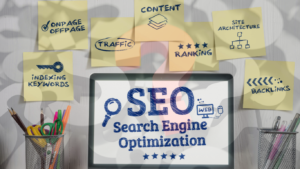
The Complete Guide to On-Page and Off-Page SEO
Understanding what is on-page search engine optimization (SEO) and off-page SEO is essential for anyone looking to boost their website’s visibility and ranking on search engines. Whether you’re a novice or an experienced digital marketer, grasping the intricacies of on-page optimization and off-page SEO methods can significantly impact your site’s performance. This comprehensive guide will break down the key elements of both strategies, offering practical tips and techniques to help you enhance your online presence effectively. To gain a deeper understanding of SEO, you can also check out our detailed article on What is SEO?
What is On-Page Search Engine Optimization?

The process of improving individual web pages to improve their search engine ranking and attract more relevant visitors is known as “on-page SEO.” This involves a variety of strategies and techniques that focus on improving the content and HTML source code of a page. The goal is to make your website more attractive to both users and search engines.
On-page SEO techniques include
To excel in on-page SEO, focus on the following strategies:
1. Keyword Research and Optimization
Finding relevant keywords that your target audience is searching for is the process of conducting keyword research. Tools like Google Keyword Planner, Ahrefs, and SEMrush can help you discover keywords with high search volume and low competition. Proper keyword optimization ensures that search engines can understand the context and relevance of your content to user queries.
2. Content Quality and Relevance
Creating high-quality, engaging, and informative content is crucial for retaining visitors and improving your site’s SEO. Your content should answer users’ queries, provide value, and be well-researched. The goal is to create content that resonates with your audience and encourages them to spend more time on your site.
3. Meta Tags
Meta tags include meta titles and descriptions that provide search engines with a summary of your page’s content. Craft compelling meta titles and descriptions that include your target keywords to improve click-through rates from search engine results pages (SERPs).
4. Internal Linking
Internal linking involves strategically linking to other pages on your website to improve navigation and user experience. Internal links help distribute page authority and encourage users to explore more content on your site. Use relevant anchor text that includes keywords to enhance the SEO value of your internal links.
5. Mobile-Friendliness
With the increasing number of users accessing the internet via mobile devices, mobile-friendliness is a critical aspect of on-page SEO. Make sure your website loads quickly and works well on all types of devices. Use tools like Google’s Mobile-Friendly Test to check your site’s mobile usability and make necessary adjustments to improve navigation, readability, and overall user experience on mobile devices.
Importance of On-Page SEO
Focusing on on-page optimization is essential because it helps search engines understand your website and its content, as well as identify whether it is relevant to a user’s search query. By implementing effective on-page SEO techniques, you can ensure that your website is both user-friendly and search engine-friendly.
High-quality content that is optimized for search engines will naturally attract more visitors, reduce bounce rates, and increase the time users spend on your site. This, in turn, signals to search engines that your site is valuable and relevant, which can lead to higher rankings.
What is Off-Page SEO?

Off-page search engine optimization (SEO) refers to all the activities and efforts that occur outside of your website to improve its visibility and ranking on search engine results pages (SERPs). While on-page SEO focuses on optimizing elements within your website, off-page SEO aims to enhance your site’s authority, relevance, and trustworthiness through external factors. These activities are crucial for building your website’s reputation and establishing it as a credible source of information in your industry.
Off-Page SEO Optimization Techniques
To excel in off-page SEO, focus on the following strategies:
1. Backlink Building
Backlinks are URLs pointing to your website from other websites. They are a critical factor in off-page SEO because search engines view them as votes of confidence. The more high-quality, relevant backlinks you have, the more authoritative your site appears to search engines.
2. Social Media Engagement
Promoting your content on social media platforms is a powerful way to increase its visibility and drive traffic to your site. Engaging with your audience on platforms like Facebook, Twitter, LinkedIn, and Instagram can help build your brand and generate backlinks. Your rankings may rise as a result of social media activity, which tells search engines that your material is worthwhile and pertinent.
3. Local Listings and Citations
Ensuring your business is listed in local directories and citation sites is crucial for local SEO. These listings help search engines verify your business’s existence and improve its visibility in local search results. Make sure your business information (name, address, phone number) is consistent across all listings to enhance your off-page SEO efforts
4. Guest Blogging
Writing content for other websites in your business is known as guest blogging.This strategy not only helps you gain exposure to a new audience but also allows you to earn high-quality backlinks to your site. When writing guest posts, focus on providing valuable, informative content that resonates with the target audience. Include links back to your website naturally within the content to improve your off-page SEO.
5. Forum Posting
Participating in industry-related forums and online communities is another effective off-page SEO technique. By engaging in discussions, answering questions, and providing valuable insights, you can establish yourself as an authority in your field. Include links to your content where relevant to drive traffic and earn backlinks.
Importance of Off-Page SEO
Off-page search engine optimization (SEO) is crucial for enhancing your website’s visibility, authority, and overall ranking on search engine results pages (SERPs). While on-page SEO focuses on optimizing elements within your website, off-page SEO extends beyond your site to improve its credibility and reputation in the digital ecosystem.The primary benefit of off-page SEO is that it helps establish your website as an authoritative source. Search engines are informed that your material is reliable and valuable when it has high-quality backlinks from respectable websites. This increases your website’s domain authority, which is a significant factor in ranking algorithms.
Off-page SEO supports brand building by increasing your online visibility and trust. When your site is mentioned and linked by authoritative sources, it boosts credibility, leading to higher user trust and conversion rates. Additionally, for local businesses, off-page SEO improves local search visibility through local listings and community engagement.
Difference Between On-Page and Off-Page SEO
Understanding the difference between on-page and off-page SEO is fundamental to creating a balanced SEO strategy. While on-page SEO focuses on optimizing the elements within your website, off-page SEO is about enhancing your website’s authority and reputation through external activities.
On-page SEO is under your control and can be directly influenced by changes you make to your site. Off-page SEO, on the other hand, relies on external factors, such as the quality and quantity of backlinks and social signals. On-page optimization involves directly improving the content and structure of your website. This includes ensuring that your site is technically sound, has high-quality content, and is optimized for keywords relevant to your business.
Off-page SEO focuses on activities outside your website that affect your search engine rankings. This includes building backlinks, engaging with your audience on social media, and generating brand mentions across the web. Engaging in off-page SEO activities, such as social media engagement, guest blogging, and influencer outreach, enhances your online reputation and drives referral traffic. These actions also generate social signals, which, while not direct ranking factors, contribute to your overall online presence.
Conclusion
Mastering both on-page and off-page SEO is essential for any blog aiming to achieve higher search engine rankings and drive relevant traffic. The key to successful SEO is consistency and authenticity. Continuously create high-quality content, engage genuinely with your audience, and build relationships with other bloggers and influencers. By implementing these best practices, you’ll be well on your way to building a strong online presence and achieving your blogging goals.


